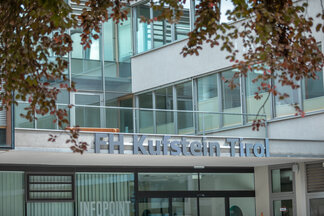Our full-time master's program in International Business Studies equips you for a career in marketing or finance. Specialize in an international setting and achieve your goals.

International Business Studies
Master's degree program
Overview
-
Qualification Level:
Stufe 2, Master -
Price:
Euro 363,36* (excl. Student Union-fees) each semester -
Academic Degree:
Master of Arts in Business (MA) -
Academic Program:
Full-time -
Language:
100% English -
Remote Options:
E-Learning max. 30 % online -
Exchange Semester:
Integrated international study trip in the 4th semester** -
Admission Requirements:
General admission requirements -
Study Places per Year:
25
Program Description



Digital and global – this is the future workplace. Many things are being reinvented, and the best part is that companies are urgently seeking managers to play a strategic role in driving major transformations. There are plenty of challenges, from digitalization and sustainability to artificial intelligence!
Our master's degree program in International Business Studies prepares students to become innovative managers in the global business environment. It emphasizes key skills such as analytical thinking, strategic planning, and intercultural communication. With an international focus, courses taught entirely in English, and a study trip, students are well-prepared for global challenges and can broaden their cultural competence. Our graduates are renowned for their expertise in marketing, finance, and project management. This full-time, practice-oriented program develops students into strategic thinkers, equipping them for future leadership roles.
Study Focus
-
26 %
Expertise in international business management
-
09 %
Expertise in digitalization & sustainability
-
40 %
Specialization in either marketing or financing
-
06 %
Social & International Skills
-
19 %
Practical transfer & Master's thesis
What You Will Learn
-
International business and management competences: Specialization in processes, strategy and change management
-
Methodical-scientific Competences: Research, quantitative methods, structured problem solving
-
Language and cultural competences: studying in English, cultural understanding, language skills
-
Social competences: Interpersonal skills, communication, teamwork, self-management
-
Digitalization and sustainability skills: Awareness of digital transformation, sustainability
-
Practical transfer and implementation skills: Putting theory into practice, innovative solutions, strategy
-
Specialization (Marketing or Finance): International Marketing Management / Corporate Finance
Popular Occupational Fields
- Marketing, sales and product management
- Finance & Accounting, Controlling
- Personnel & organisational development
- Consulting, project management and business development
- Entrepreneurship / Start-up
- Operational capability across all industries, company sizes and types, as well as in non-profit organizations (NPOs) and non-governmental organizations (NGOs).
Career Opportunities
-
16 % of domestic SMEs
active in cross-border online sales
-
20,000 new jobs per year
in Austria through digitalisation
-
53 % export share
of Austrian GDP
-
> 160 hidden champions
in Austria
The path to the Master's degree

The didactic concept of the master's degree program ensures the development of specialist and non-specialist key competencies for overcoming the challenges of a VUCA world (volatility, uncertainty, complexity, ambiguity). The course promotes self-organisation, flexibility and creative problem-solving by increasing the openness of teaching and learning settings.
Special features:
-
1st semester (VUCA-based): Adaptation and orientation are supported in the first semester.
-
2nd semester (VUCA-intermediate): Increased self-organization in the 2nd semester, including in-depth study and processing of complex topics.
-
3rd/4th semester (VUCA-pro): Maximum openness and independence are encouraged in the second year of study.
Recognition of Prior Learning
Students have the option to receive credit for skills and competencies they have already acquired before the start of each semester.
To apply for credit, they must submit a request directly to the Director of Studies.
Director of Studies

Prof. (FH) Dr. Peter Dietrich
Director of Studies Bachelor / Master International Business Studies
Curriculum
• Fundamentals and basic concepts of digitization
• Digitization in the context of business administration in connection with theories and approaches
• Influence of digitization on markets, industries, companies and business areas
• Processing of case studies and current examples from business practice
• Effects of digitization on the management, organization and culture of companies based on the St. Gallen Management Model
• Presentation of proven digitization methods
• Independent development of digitization tools by students
• Solution of specific case studies of digitization
• Ethics and morals in theory and practice
• Discussion of orthodox management approaches (among others: principal agent theory, shareholder value approach) from an ethical perspective
• Soft- vs. hard-law and its influence on the sustainability of management decisions
• Sustainable Development Goals (SDGs)
• Market model and demand elasticity
• Economies of scale and network externalities
• Perfect competitive market, monopoly and monopolistic competition
• Pricing and profit maximization
• Digital technologies and market concentration
• Core topics, theories and models of strategic management
• Strategy in the context of the St. Gallen Management Model and management cybernetics
• Fundamentals of transformation and innovation management
• Leadership processes in connection with strategy (analysis, planning and implementation methods)
• Overview of the most important strategy tools
• Basics for the development of methods and solutions for entrepreneurial strategy cases
• Impulses for solution development
• Methodical, procedural and content-related reflection
• Basic concepts of organizational theory
• Fundamentals of organizational psychology
• Selected topics such as leadership, teamwork, conflicts
• Organizational climate and organizational culture
• Organizational diagnosis and organizational development
• Fundamentals of behavioral economics
• Communication of the currently most important and most-discussed strategy topics that are not yet or not sufficient-ly scientifically or practically penetrated
• Development of theories, models, methods and solutions for these current strategy topics and connection with other business-related management approaches
• First application examples and best practices for these topics
• Mutual exchange of expertise and presentation of contents and solutions
The course will focus on the following points:
• Future of sport, culture and events in terms of importance
• The use of marketing tools in projects
• Scientific analysis of marketing campaigns in practice
• Current trends in international business in both theory and practice
• Economic, political and social impacts
• Industry and R&D activities
• Digital developments
• Creation and evaluation of trends, fashions, booms
• Basics of change management in connection with other economic and social science approaches, communication and conflict management
• Basics of organizational development in connection with questions of strategy, structure and leadership
• Application of the topics to case studies
• Elaboration of solutions and independent development of methods
Current subject areas and questions are offered in order to give students the opportunity to expand or supplement the regular IBS curriculum.
• Expert interviews and group discussions
• Survey methods in qualitative survey and observation
• Qualitative selection procedures and content analysis
• Interpretative text evaluation and grounded theory
• Creation of survey design for conjoint analysis
• Combination of methods
• Multivariate methods and OLS regression
• Estimation of coefficients with hypothesis tests
• Interpretation of indicators for goodness of fit model
• Multicollinearity and heteroskedasty
• Statistical software like STATA or R
• Topic development and preparation in the context of a poster and an exposé
• Presentation and discussion of a poster in small groups
• Poster and exposé creation
• Characteristics, rules and basic features of science and scientific work
• Scientific theory and methodology of scientific research
• Overview of databases and other ways to find literature sources
• Formal standards of scientific work
• Planning of research processes
• Quality assurance
• Analysis of nominal/ordinal scaled dependent variables
• Logit/Probit models and Maximum Likelihood Estimation
• Empirical preference estimation and conjoint analysis
• Determinants of purchase decision and customer satisfaction
• Implementation of models with STATA or R
The content of supervision depends on the individual needs of the students
• Expansion of the knowledge of scientific work with regard to the development and implementation of a research design as well as the structuring of the working process
• Academic methods with MS Word or Latex
• Time series and/or panel data (if required)
• Advanced methods such as Tobit model or Poisson Regression (if required)
• Regular meetings to discuss the current status and progress of the Master thesis with the accompanying scientific supervision
• Information on the final Master's examination
• Management of teams and reflection competence
• Operational functions (production, marketing, logistics, supply chain management)
• Market analyzes and market developments
• Use of analysis tools (SWOT, benchmark, market shares, cost and contribution margin analyses, etc.)
• Development of strategies
• Monitoring and key figures
• Preparation and participation in kick-off meeting for the project
• Project management expertise
• Regular project documentation and adherence to timelines
• Coordination with other project members
• Research on the specific company situation
• Development of a possible solution
• Presentation of the solution to company representatives
• Practical cases are analyzed in course, generally based on Harvard business cases. The focus here is on entrepre-neurial financing and investment decisions.
• The aim is to compare companies on the basis of annual financial statements, among others by means of SWOT, key figure analysis, from the point of view of economic efficiency and to advise on strategic financing and investment decisions, including marketing decisions.
• Basic information on communicative processes and effects
• Fundamentals of cooperation, negotiation, conflict resolution as well as group dynamics and team leadership
• Self-efficacy, self-control, resilience, self-management, work-life balance
• The focus of this course is to impart knowledge of the rules of international accounting according to IFRS and their direct application to the fixed assets of a company.
• Furthermore, simple annual financial statements are analyzed and prepared.
• The course also focuses on learning how to set up an effective internal monitoring system within the company and how to efficiently manage cash, receivables and inventories.
• Practical cases are analyzed as a main focus of this course, generally based on Harvard business cases. The focus is mainly on corporate financing and investment decisions as well as liquidity management.
• The aim is to compare companies based on annual financial statements, including an analysis of key figures, from the point of view of profitability and to advise them on strategic financing and investment decisions.
• The course content includes the transfer of knowledge in the field of financing options for start-ups and established companies on international capital markets and with the help of private intermediaries.
• In addition, the topics of working capital management and securing liquidity are analyzed in greater depth.
• Study trip lasting several days with a visit to one or more companies or institutions.
• Students are confronted with current and specific challenges.
• Students analyze the situation and work out potential solutions, which are presented and discussed with company representatives.
• The focus of this course is on acquiring and expanding knowledge of current corporate trends and financial innova-tions by means of current financial articles.
• Sample trends concern the field of digitization and sustainability developments in entrepreneurial investment and financing decisions, block-chain based innovations as well as mechanisms such as:
• Trends in managers' remuneration strategies
• New financing and investment opportunities for companies
• Financing via crowdsourcing and funding
• Crypto currencies and related financial technologies (fintech)
• Digital payment systems
• Sustainable investment rules (keyword: green finance, ESG rules)
• Students expand their financial knowledge of the importance and potential determinants of the capital structure of a company, based on the Modigliani-Miller theorems.
• They also expand their financial knowledge in the field of company valuation (multiples, discounted cash flow: WACC, APV, CCF) and apply it in the context of start-ups, share issues and mergers and acquisitions.
• Extension of the basic principles of international accounting in accordance with IFRS and extended application to issues relating to fixed assets, liabilities and equity - in particular share and bond issues or purchases.
• A cash flow statement in accordance with IFRS is also prepared as part of the preparation of more complex annual financial statements.
• Finally, the general idea of consolidating the annual financial statements of affiliated companies is presented and applied to individual questions.
• Analysis of practical cases.
• The focus of this course is to acquire and expand knowledge of available investment alternatives and modern portfolio theory.
• Different asset classes are analyzed and personal investment decisions are made based on the risk-return profiles and personal preferences.
• Definition and delimitation of the term brand
• Positioning as proof of the significance and strength of the brand in the competitive environment
• Growth and maintenance of a brand
• Strategic measures (brand expansion, brand wear, brand rejuvenation), even in a demanding market environment (e.g. in saturated markets)
• Influence of the brand on the consumer's buying decision
• Strategy process, consisting of analysis, development, conception and realization
• As-is analysis of the marketing-relevant environment (market, industry, business models) and of marketing in your own company
• Definition of possible marketing goals (among others with the approach of "segmenting, targeting, positioning")
• Development of marketing strategies for goal attainment under marketing strategy aspects
• Key figures on degrees of goal attainment and their monitoring
• Application of the marketing mix for products (4P) to real issues
• Application of the marketing mix for services (7P) to real issues
• Research and selection of specific tools of the individual marketing mix factors
• Creation of marketing plans including budget calculation and timing
• Study trip lasting several days with a visit to one or more companies or institutions
• Students are confronted with current and specific challenges
• Students analyze the situation and work out potential solutions, which are presented and discussed with the company representatives
• Overview of the entire marketing sciences
• Analyze, discuss and independently work on selected, current issues in the field of marketing within the framework of a project and/or on the basis of practical projects or scientific articles.
• Analysis of marketing issues
• Application of knowledge to the issues
• Application of customer-oriented analysis tools (e.g. ABC analysis, target group analysis, satisfaction analysis, cus-tomer journey) based on case studies/practical examples
• Application of market-oriented analysis tools (e.g. BCG, McKinsey, 5-Forces, Ansoff) on the basis of case stud-ies/practical examples
• Terms and basics of CRM, basics of data analysis for CRM activities
• Techniques of estimating market and customer potential including plausibility checks
• Combining the above analysis tools with findings of conventional market research on customer needs and customer satisfaction
• Integration of the findings into business and marketing plans
• Basics of marketing communication
• Basics of digital communication
• Development of a digital marketing strategy
• Development of a digital marketing mix
• Evaluation of a digital marketing concept
• Basics of customer relationship management (CRM)
• Identify, assess and focus on marketing issues in the corporate context
• Analyze the problem situation and work out possible solutions
• Plan and organize the internal procedures in a consulting team to answer the marketing question
• Solve the problem and present the solution
• Concept of culture and cultural models
• Sensitization for international and multicultural working environments
• Based on culture-specific characteristics according to Hofstede, Trompenaars, Thomas, etc., the meaningful use of management tools adapted to cultural characteristics is developed in order to lead international teams and solve intercultural conflicts
• Fundamentals and basic concepts of digitization
• Digitization in the context of business administration in connection with theories and approaches
• Influence of digitization on markets, industries, companies and business areas
• Processing of case studies and current examples from business practice
• The focus of this course is to impart knowledge of the rules of international accounting according to IFRS and their direct application to the fixed assets of a company.
• Furthermore, simple annual financial statements are analyzed and prepared.
• The course also focuses on learning how to set up an effective internal monitoring system within the company and how to efficiently manage cash, receivables and inventories.
• Definition and delimitation of the term brand
• Positioning as proof of the significance and strength of the brand in the competitive environment
• Growth and maintenance of a brand
• Strategic measures (brand expansion, brand wear, brand rejuvenation), even in a demanding market environment (e.g. in saturated markets)
• Influence of the brand on the consumer's buying decision
• Application of the marketing mix for products (4P) to real issues
• Application of the marketing mix for services (7P) to real issues
• Research and selection of specific tools of the individual marketing mix factors
• Creation of marketing plans including budget calculation and timing
• The course content includes the transfer of knowledge in the field of financing options for start-ups and established companies on international capital markets and with the help of private intermediaries.
• In addition, the topics of working capital management and securing liquidity are analyzed in greater depth.
• Strategy process, consisting of analysis, development, conception and realization
• As-is analysis of the marketing-relevant environment (market, industry, business models) and of marketing in your own company
• Definition of possible marketing goals (among others with the approach of "segmenting, targeting, positioning")
• Development of marketing strategies for goal attainment under marketing strategy aspects
• Key figures on degrees of goal attainment and their monitoring
• Practical cases are analyzed as a main focus of this course, generally based on Harvard business cases. The focus is mainly on corporate financing and investment decisions as well as liquidity management.
• The aim is to compare companies based on annual financial statements, including an analysis of key figures, from the point of view of profitability and to advise them on strategic financing and investment decisions.
• Market model and demand elasticity
• Economies of scale and network externalities
• Perfect competitive market, monopoly and monopolistic competition
• Pricing and profit maximization
• Digital technologies and market concentration
• Core topics, theories and models of strategic management
• Strategy in the context of the St. Gallen Management Model and management cybernetics
• Fundamentals of transformation and innovation management
• Leadership processes in connection with strategy (analysis, planning and implementation methods)
• Expert interviews and group discussions
• Survey methods in qualitative survey and observation
• Qualitative selection procedures and content analysis
• Interpretative text evaluation and grounded theory
• Creation of survey design for conjoint analysis
• Combination of methods
• Basic information on communicative processes and effects
• Fundamentals of cooperation, negotiation, conflict resolution as well as group dynamics and team leadership
• Self-efficacy, self-control, resilience, self-management, work-life balance
• Concept of culture and cultural models
• Sensitization for international and multicultural working environments
• Based on culture-specific characteristics according to Hofstede, Trompenaars, Thomas, etc., the meaningful use of management tools adapted to cultural characteristics is developed in order to lead international teams and solve intercultural conflicts
• Effects of digitization on the management, organization and culture of companies based on the St. Gallen Management Model
• Presentation of proven digitization methods
• Independent development of digitization tools by students
• Solution of specific case studies of digitization
• Study trip lasting several days with a visit to one or more companies or institutions.
• Students are confronted with current and specific challenges.
• Students analyze the situation and work out potential solutions, which are presented and discussed with company representatives.
• Study trip lasting several days with a visit to one or more companies or institutions
• Students are confronted with current and specific challenges
• Students analyze the situation and work out potential solutions, which are presented and discussed with the company representatives
• Students expand their financial knowledge of the importance and potential determinants of the capital structure of a company, based on the Modigliani-Miller theorems.
• They also expand their financial knowledge in the field of company valuation (multiples, discounted cash flow: WACC, APV, CCF) and apply it in the context of start-ups, share issues and mergers and acquisitions.
• Application of customer-oriented analysis tools (e.g. ABC analysis, target group analysis, satisfaction analysis, cus-tomer journey) based on case studies/practical examples
• Application of market-oriented analysis tools (e.g. BCG, McKinsey, 5-Forces, Ansoff) on the basis of case stud-ies/practical examples
• Terms and basics of CRM, basics of data analysis for CRM activities
• Techniques of estimating market and customer potential including plausibility checks
• Combining the above analysis tools with findings of conventional market research on customer needs and customer satisfaction
• Integration of the findings into business and marketing plans
• The focus of this course is on acquiring and expanding knowledge of current corporate trends and financial innova-tions by means of current financial articles.
• Sample trends concern the field of digitization and sustainability developments in entrepreneurial investment and financing decisions, block-chain based innovations as well as mechanisms such as:
• Trends in managers' remuneration strategies
• New financing and investment opportunities for companies
• Financing via crowdsourcing and funding
• Crypto currencies and related financial technologies (fintech)
• Digital payment systems
• Sustainable investment rules (keyword: green finance, ESG rules)
• Overview of the entire marketing sciences
• Analyze, discuss and independently work on selected, current issues in the field of marketing within the framework of a project and/or on the basis of practical projects or scientific articles.
• Analysis of marketing issues
• Application of knowledge to the issues
• Extension of the basic principles of international accounting in accordance with IFRS and extended application to issues relating to fixed assets, liabilities and equity - in particular share and bond issues or purchases.
• A cash flow statement in accordance with IFRS is also prepared as part of the preparation of more complex annual financial statements.
• Finally, the general idea of consolidating the annual financial statements of affiliated companies is presented and applied to individual questions.
• Analysis of practical cases.
• Basics of marketing communication
• Basics of digital communication
• Development of a digital marketing strategy
• Development of a digital marketing mix
• Evaluation of a digital marketing concept
• Basics of customer relationship management (CRM)
• Overview of the most important strategy tools
• Basics for the development of methods and solutions for entrepreneurial strategy cases
• Impulses for solution development
• Methodical, procedural and content-related reflection
• Basic concepts of organizational theory
• Fundamentals of organizational psychology
• Selected topics such as leadership, teamwork, conflicts
• Organizational climate and organizational culture
• Organizational diagnosis and organizational development
• Fundamentals of behavioral economics
• Multivariate methods and OLS regression
• Estimation of coefficients with hypothesis tests
• Interpretation of indicators for goodness of fit model
• Multicollinearity and heteroskedasty
• Statistical software like STATA or R
• Ethics and morals in theory and practice
• Discussion of orthodox management approaches (among others: principal agent theory, shareholder value approach) from an ethical perspective
• Soft- vs. hard-law and its influence on the sustainability of management decisions
• Sustainable Development Goals (SDGs)
• Identify, assess and focus on marketing issues in the corporate context
• Analyze the problem situation and work out possible solutions
• Plan and organize the internal procedures in a consulting team to answer the marketing question
• Solve the problem and present the solution
• The focus of this course is to acquire and expand knowledge of available investment alternatives and modern portfolio theory.
• Different asset classes are analyzed and personal investment decisions are made based on the risk-return profiles and personal preferences.
• Communication of the currently most important and most-discussed strategy topics that are not yet or not sufficient-ly scientifically or practically penetrated
• Development of theories, models, methods and solutions for these current strategy topics and connection with other business-related management approaches
• First application examples and best practices for these topics
• Mutual exchange of expertise and presentation of contents and solutions
The course will focus on the following points:
• Future of sport, culture and events in terms of importance
• The use of marketing tools in projects
• Scientific analysis of marketing campaigns in practice
• Current trends in international business in both theory and practice
• Economic, political and social impacts
• Industry and R&D activities
• Digital developments
• Creation and evaluation of trends, fashions, booms
• Basics of change management in connection with other economic and social science approaches, communication and conflict management
• Basics of organizational development in connection with questions of strategy, structure and leadership
• Application of the topics to case studies
• Elaboration of solutions and independent development of methods
• Topic development and preparation in the context of a poster and an exposé
• Presentation and discussion of a poster in small groups
• Poster and exposé creation
• Characteristics, rules and basic features of science and scientific work
• Scientific theory and methodology of scientific research
• Overview of databases and other ways to find literature sources
• Formal standards of scientific work
• Planning of research processes
• Quality assurance
• Analysis of nominal/ordinal scaled dependent variables
• Logit/Probit models and Maximum Likelihood Estimation
• Empirical preference estimation and conjoint analysis
• Determinants of purchase decision and customer satisfaction
• Implementation of models with STATA or R
• Management of teams and reflection competence
• Operational functions (production, marketing, logistics, supply chain management)
• Market analyzes and market developments
• Use of analysis tools (SWOT, benchmark, market shares, cost and contribution margin analyses, etc.)
• Development of strategies
• Monitoring and key figures
• Preparation and participation in kick-off meeting for the project
• Project management expertise
• Regular project documentation and adherence to timelines
• Coordination with other project members
• Research on the specific company situation
• Development of a possible solution
• Presentation of the solution to company representatives
Current subject areas and questions are offered in order to give students the opportunity to expand or supplement the regular IBS curriculum.
The content of supervision depends on the individual needs of the students
• Expansion of the knowledge of scientific work with regard to the development and implementation of a research design as well as the structuring of the working process
• Academic methods with MS Word or Latex
• Time series and/or panel data (if required)
• Advanced methods such as Tobit model or Poisson Regression (if required)
• Regular meetings to discuss the current status and progress of the Master thesis with the accompanying scientific supervision
• Information on the final Master's examination
• Practical cases are analyzed in course, generally based on Harvard business cases. The focus here is on entrepre-neurial financing and investment decisions.
• The aim is to compare companies on the basis of annual financial statements, among others by means of SWOT, key figure analysis, from the point of view of economic efficiency and to advise on strategic financing and investment decisions, including marketing decisions.
Study regulations to download
-
International Business Studies
in effect since October 11, 2023, start of study program from academic year 2024/25
- All study regulations
Frequently Asked Questions
Can I work while studying?
Classroom teaching usually occurs from Monday to Friday, occasionally on Saturdays in blocked units. With a significant amount of self-study, students can manage their schedules independently and have the flexibility to work part-time in the industry.








